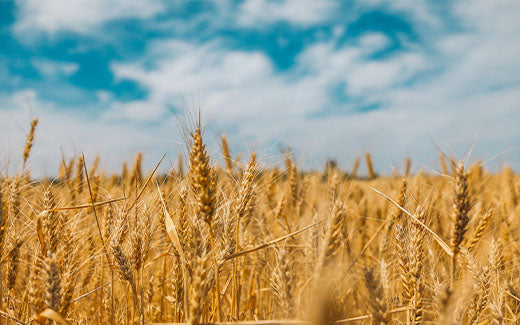Gluten is a group of proteins found in grains like Wheat, Rye, Barley and associated foods that you are bound to be familiar with, for example -bread, pasta, cereal, semolina, spelt etc… The gluten in the grain acts like a sticky glue - this stretchy like-quality lends itself to cooking as it helps food to hold its shape -hence why it is found in so many goods e.g. baking breads, pizzas, pasta, soups, cereals and sauces.
The NHS states that 1 in every 100 people is affected by coeliac diasese (an auto-immune condition) in the UK!
Should we all be avoiding gluten?
Firstly, if you think you are suffering from Coeliac disease it is important to see your GP for a blood test or biopsy as a first resort rather than opting for a gluten-free diet. This is because a test will look for elevated levels of certain anti-body proteins that will indicate an immune reaction to gluten. Therefore you will need to be eating gluten to give accurate results.
If you are considering cutting out any food its worth doing a bit of research and consider replacing the nutrients and macro-nutrients you might be missing out on. Your best bet is to ensure you're not missing out on fibre, B Vitamins, magnesium and iron as these vitamins and minerals may be the ones inadvertently reduce as a bi-product of going gluten free. By filling your diet with gluten-free foods in their complete form like nuts, seeds, fruits, veggies, fish, eggs and poultry you will be ensuring a good chance of getting a good range of vitamins, minerals and good nutrition.
Experimenting with alternative whole grains such as Quinoa, Brown, black or red rice, buckwheat, amaranth, corn, millet, teff and of course gluten-free oats can be a good way to satisfy your cravings. There are now hundreds if not thousands of gluten free products on the market so it’s much easier these days to convert to gluten free if you need to. You can opt for things like gluten free tortillas, gluten-free pizza dough rolled in cornmeal will give it a super crispy base or even corn chips paired with a dip like Guacamole or Humous can give you double bubble nutrition!!! Buckwheat pancakes and oat muffins topped with chia seed jam are another duo made in heaven!
There are a ton of amazing gluten-free recipe writers out there - so, rather than feeling like you are missing out it can be a chance to discover a whole new world of food alternatives!
What is gluten intolerance?
Different to actual Coeliac disease, Gluten Intolerance is also known as Non-Coeliac GlutenSensitivity and can cause similar symptoms but no anti-bodies are produced as would be the case with an actual Coeliac. A wheat allergy will cause a distinct and rapid reaction, however, an Intolerance can take time to show visibility. If an intolerance is something that may be affecting you, you can try an intolerance test or an elimination diet. A diet where you remove suspect trigger foods for 2-3 weeks and look to re-introduce food groups over 2-3 days while looking at symptoms.
What is coeliac disease?
Coeliac disease is an auto-immune condition. When gluten is consumed the body’s immune system attacks itself causing damage to the lining of the gut (small intestine). This, in turn, means that the body cannot properly absorb nutrients from food.
Not everyone needs to avoid gluten, however, figures by the NHS may well be under-estimated as not everyone is tested regularly for gluten-intolerances and sometimes symptoms can be diagnosed as IBS or other digestive issues.
Looking after our gut and general well-being through eating a wide variety of nutritious foods including fermented foods like sauerkraut, kimchi, kefir and sourdough to name a few. Boosting your diet with supplementation can be good way to help if you feel like you are struggling with specific areas of your health. Of course, if you suspect you have Coeliac disease it would be advisable to get a blood test or biopsy.
Advice for digestive or gut issues - try Gut Biome Zooki as a probiotic which can help with digestive health, digestive discomfort, clearer skin and better immunity! Pairing it with Turmeric is a "dynamic duo of digestive support and reducer of inflammation!”






Share:
Stress and the gut-brain axis
A guide to fasting